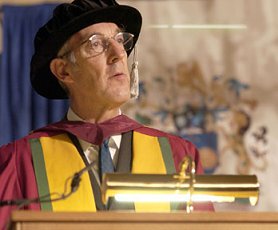Centre for the study of Education in an International Context (CEIC)
News
Please visit this space for more news soon.
News Archive
Professor George Walker, OBE receives honorary doctorate
The University of Bath graduation ceremony held on the morning of 9 December 2003 in the Assembly Rooms in Bath saw the award of qualifications including 48 Masters degrees and 4 Doctoral degrees from the Department of Education. In addition, this occasion was the setting for the award of the honorary degree of Doctor of Education to Professor George Walker, Director General of the International Baccalaureate Organization. Previously Director General of the International School of Geneva, George Walker has since 1997 been a Visiting Professor in the Department of Education at the University of Bath, attached to CEIC, and makes regular contributions to MA, EdD and PhD teaching and supervision in this connection. The conferment of the honorary award by Lord Tugendhat, the University Chancellor, was preceded by an oration ![]() given on behalf of the University by Dr Mary Hayden and followed by a response from George Walker. Congratulations Dr Walker!
given on behalf of the University by Dr Mary Hayden and followed by a response from George Walker. Congratulations Dr Walker!
George Walker's response
Chancellor, Mr Mayor, fellow graduates, ladies and gentlemen:
Let me start in traditional, and entirely appropriate, fashion by congratulating all of you who are graduating this morning and, moreover, are doing it through your own hard work, without recourse to the persuasive voice of the university's orator!
Access to graduate and post-graduate education in this country has undoubtedly become wider in recent years but that has not necessarily made it any easier. I am quite sure that under the surface of your successes lie sacrifices, support systems and difficult decisions about priorities. I am also quite sure that today you will believe it has all been completely worthwhile. I congratulate you all on your hard-earned success.
Kofi Annan, Secretary General of the United Nations, once described education as "peace keeping by another name." If we accept that, then international education assumes an even more important role. In a shrinking and rather fragile world, the understanding of other cultures, the capacity to work in teams across national frontiers and the ability to communicate effectively with people who have very different value systems to our own all become essential parts of any system of education.
I am therefore delighted that the honour you have conferred on me today highlights two organizations whose business lies in international education. From modest beginnings in 1968, the International Baccalaureate Organization is now influencing the education of around two hundred thousand students in 115 different countries. In the United Kingdom it has grown steadily in respect and influence to become widely accepted as a model for the reform of national systems of education. Indeed, only one thing seems to be holding it back: the difficulty most people have in spelling it correctly!
The University of Bath has always been one of the IBO's strongest supporters, hosting our research operations, working with our staff and welcoming our students. This is hardly surprising when the university itself is home to one of the most effective catalysts for the development of international education anywhere in the world, the Centre for the Study of Education in an International Context. The members of staff of the CEIC, led by Dr Mary Hayden, are amongst the university's most effective ambassadors as they bring high quality post-graduate education, plus a very warm welcome, to teachers all around the world.
Let me return to those of you graduating today. You have received an unusually fine education and although I spoke a moment ago of widening access, the fact remains that many young people have no access to education at all. In the Commonwealth alone (and I quote this figure because Commonwealth education ministers met recently in Edinburgh) 75 million children simply have no school to go to. And many of those that have a building are finding the education it houses slowly destroyed by the deadly progress of HIV/AIDS.
Some of you are already, or will become, teachers. Some of you will find yourselves in positions of considerable influence. Every one of you has time and important skills. I hope you will all use the educational advantages you have received to help increase the chances of people receiving even a basic education. Because in the end, ignorance is in no one's interest and education is peace keeping by another name.
Chancellor: I am deeply grateful for the honour that has been bestowed upon me by this university with which I have had a close association for many years and for which I have such affection and such respect.


